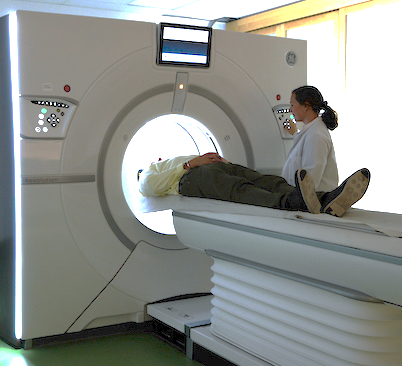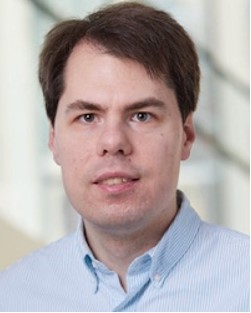News from MedTechLabs – a multidisciplinary research centre hosted at SCI
Sweden has long been a pioneer in innovative medical technology solutions for the healthcare sector. Swedish innovations such as the pacemaker, the Gamma Knife, the ultrasound and the Seldinger technique were all developed to meet the needs of healthcare, often based upon successful collaboration between healthcare, academia and industry. MedTechLabs is successfully nurturing that legacy.

MedTechLabs is an interdisciplinary centre for medical technology research. The goal is to become a world leader when it comes to medical technology innovations and takes on Stockholm’s proud heritage to create better conditions for patient survival and improved quality of life for those with cancer, cardiovascular and other non-communicable diseases at a lower cost. The next generation of Computed Tomography technology is being developed here, to the benefit of millions of patients worldwide. It’s based on the work performed by Professor Mats Danielsson’s group at KTH Royal Institute of Technology. The key to success is collaboration within interdisciplinary teams with various cutting-edge competencies.
The Centre was launched in 2018 by KTH, Karolinska Institutet and Region Stockholm. New knowledge and implementable solutions also contribute to the development of the Stockholm region’s life science ecosystem, making the region an attractive investment for global companies. The Centre’s research programmes are intended to achieve breakthroughs in their respective fields and generate results that can benefit the healthcare sector within five years. The programmes therefore build on research that is already well-advanced.
Quantum leap in Computed Tomography (CT) takes place in Stockholm

The CT with photon counting silicon detector is now being verified in a clinical study at MedTechLabs, BioClinicum, adjacent to Karolinska University hospital in Solna. In 1979, Godfrey Hounsfield and Allan Cormack were awarded the Nobel Prize for their work on CT. Now the world’s first silicon-based photon counting CT system for clinical use is tested in a clinical setting at MedTechLabs in BioClinicum, Karolinska University Hospital. Photon counting CT has the promise to further expand the clinical capabilities of traditional CT for more personalized care and treatment response assessments. This technology was developed by Prismatic Sensors AB, a start-up founded by Mats Danielsson, specializing in silicon detectors for photon counting CT. The start-up was acquired by GE Healthcare in 2020.
“In the wake of COVID-19, healthcare is exhausted, and patients are scared”, shares Jean-Luc Procaccini, President & CEO, Molecular Imaging & Computed Tomography, GE Healthcare, and continues:
“Medical technology providers must respond with innovative solutions that make the system more human by breaking down barriers so clinicians can work at the top of their game, healthcare systems can operate more efficiently, and patients get the best and most precise care possible. For nearly 50 years, computed tomography (CT) has proven to be a vital imaging tool used by clinicians to detect cancer, heart conditions, and other diseases large and small. CT’s clinical use and diagnostic power have rapidly increased with the introduction of volumetric imaging, faster rotation speed, iterative and AI-based image reconstruction, dual energy, as well as dose reduction technologies. Now, through GE’s dedication to CT innovation, photon counting CT technology has the potential to define the new standard of performance for premium CT systems for many years to come. The world’s first silicon-based photon counting CT system is now being tested in a clinical setting at Karolinska Institutet and MedTechLabs in BioClinicum, Karolinska University Hospital. Through the acquisition of Prismatic Sensors, we have increased our presence in the life science cluster of Stockholm-Uppsala, where we are a large employer with approximately 250 people employed across research, manufacturing, sales and administration.”

Mats Persson’s research is focused on new medical X-ray imaging techniques. The next leap forward for computed tomography (CT) is the introduction of photon-counting detectors, a technology that promises images with better diagnostic quality and improved capability to measure tissue composition, and at lower doses of radiation for the patient. Mats is working in close collaboration with the Hardware Development Group at the same department, headed by Mats Danielsson, and consisting of mathematical researchers at KTH and medical researchers at Karolinska Institutet. Mats Persson graduated from KTH with a PhD in physics in 2016. After graduating, he spent three years as a postdoctoral fellow at Stanford University and the GE Research Center.
Strengthening the Stockholm region’s life science cluster
A comparative study by Cascelotte AB, that analysed the strength of granted patents and the probability that they will have an economic impact, showed that the MedTechLabs research leaders in the Spectral CT and Endovascular research programme are on a par with the world's leading research centres at Mayo Clinic and Johns Hopkins University in terms of innovation power. The fact that the MedTechLabs researchers are world-class with the ability to commercialize their research will attract larger companies to invest in the Stockholm region's Life science cluster. GE Healthcare's acquisition of Prismatics Sensors last year is an example of this.
Read more about MedTechLabs research programs and the study on the . You can also follow the Centre in social media: LinkedIn and Youtube . Also, subscribe to the MedTechLab’s monthly newsletter.
Text: Johan Schuber
Edit: Danai Deligeorgaki
